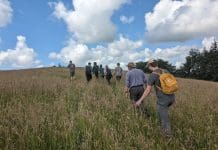Langley Mead, a popular community nature reserve in Shinfield has been given the green light to be extended
Ecological Planning and Research (EPR) is supporting the University of Reading in securing approval to double the size of popular Langley Mead, bringing nearly 40-hectares of greenspace to Loddon Valley.
Langley Mead, which is owned by the University of Reading, is currently just over 18-hectares of countryside along the banks of the River Loddon, south-east of Shinfield. The extension would double the area of high-quality green space available to local people.
The university worked closely with ecological planning consultancy, EPR Ltd, to secure approval for the extension to this Suitable Alternative Natural Greenspace (SANG).
Opened to the public in 2015, Langley Mead has become enormously popular with the local community, with an estimated 37,000 visitors per year, many of whom travel to Langley Mead on foot.
The site at Langley Mead has seen a marked uptick in biodiversity in the intervening years, with an increase in plant species from 76 to 125, eight of which are classed as rare in Berkshire. Invertebrate species have thrived, with the number of species recorded doubling between 2008 and 2019, 14 of which are considered rare, scarce or notable at a national level. 48 breeding bird species were recorded in 2019, including the red-listed species. Four Barn Owl chicks also fledged from the site’s nest box in 2018, demonstrating the robustness of the ecosystem created.
Improving local biodiversity
The extension of Langley Mead will allow the University of Reading and EPR to further improve conditions for wildlife, with an emphasis on creating a highly connected, continuous habitat that brings traditional management practices back to the landscape.
Initial works will involve translocating green hay from Langley Mead’s existing wildflower meadows, planting hedgerows, and creating wetland features – vital for restoring and developing sustainable wildlife populations.
The approval of the SANG extension will also guarantee the protection of the Thames Basin Heaths Special Protection Area (SPA) from increased recreational pressure resulting from the construction of new homes in the area.
Nigel Frankland, strategic estates manager at the University of Reading, said: “The environment plays a key role in improving the mental and physical health of communities, as well as ensuring the UK’s wildlife is able to thrive for the long term.
“Covid-19 has highlighted the need for accessible greenspace as a vital public good, so we are pleased to be able to offer even more space for local people to enjoy.”
Ben Kite, managing director at EPR, added: “We are delighted to have played a central role in seeing the Langley Mead extension through to approval. Through actions such as hedgerow planting, wildflower meadow management, and pond creation, the University of Reading are set to encourage wildlife to flourish, while incentivising people to spend more time outside in their local environment.
“The University is continuing to provide a shining example to landowners looking to improve the quality of the natural environment for local communities and the country’s wildlife.”

















